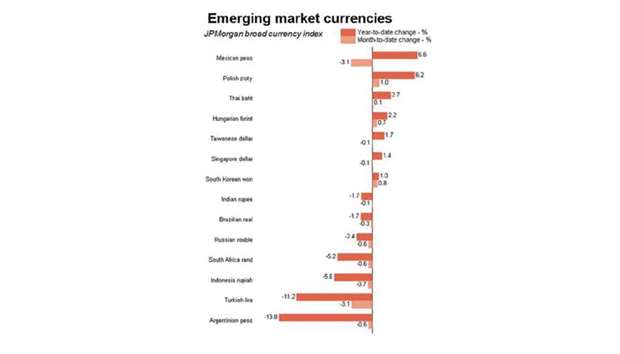A retreating dollar, solid commodity prices and new record highs for world stocks helped extend the rally in emerging markets yesterday, with stocks at new six-year highs and currencies firming almost across the board.
MSCI’s emerging equity index, which has gained 30% since the start of 2017, sailed 0.5% higher to its strongest level since August 2011 after Asian markets took a cue from Wall Street’s record close to hit a near 10-year high.
The greenback hit a two-week low after the minutes of the latest US central bank meeting revealed policymakers’ concern over persistently low inflation and raised doubts about an interest rate hike expected in December.
“The Fed minutes seem to have been taken as more dovish than expected and that is positive for emerging markets,” Crédit Agricole’s senior emerging market strategist Guillaume Tresca, said.
Currencies shrugged off the weakness they suffered in recent weeks, with JPMorgan’s ELMI Plus index, a proxy for emerging currencies, on track for weekly gains after four weeks of losses.
“We saw a good emerging markets sell-off over the last two weeks, so there is a bit of a consolidation,” Tresca added.
Adding to the chipper mood, copper prices touched their strongest in four weeks, while oil – a touch softer on the day – rose in the previous three sessions.
South Africa’s rand gained 0.4% to its strongest level in 13 days, and was on track for its best week since July.
Turkey’s lira and Russia’s rouble both matched the gains.
Mexico’s peso traded flat, however, with investors nervous as the United States, Canada and Mexico kicked off the fourth round of talks about the future of the North American Free Trade Agreement (Nafta) on Wednesday.
The peso has firmed more than 10% this year.
US President Donald Trump said he would be open to bilateral trade deals with Canada and Mexico if Nafta talks between the three countries fall apart.
“There are only negative signs (from the Nafta talks). Discussions look difficult so it could cap the peso’s appreciation,” said Tresca.
He added that a collapse of the talks would be negative but the current environment of low interest rates and strong sentiment towards emerging markets could soften the blow.

